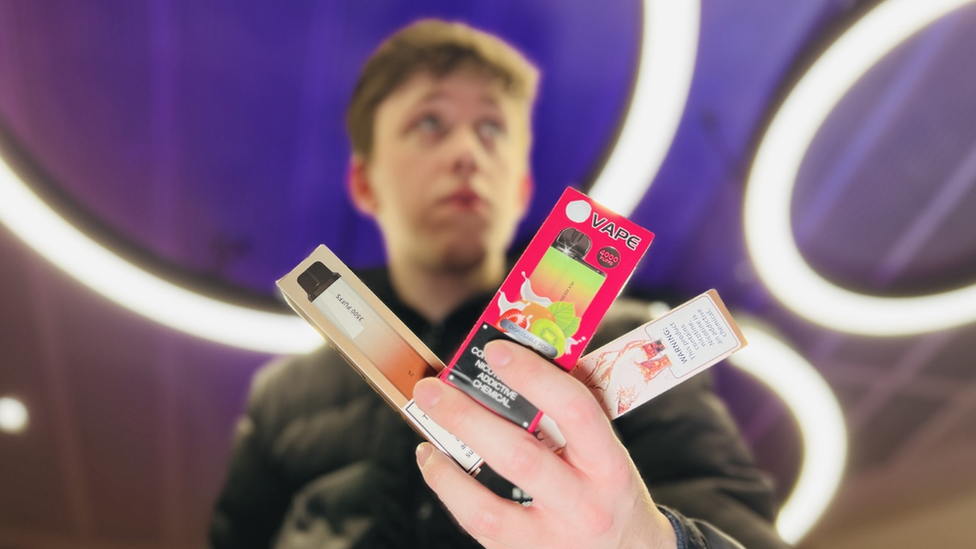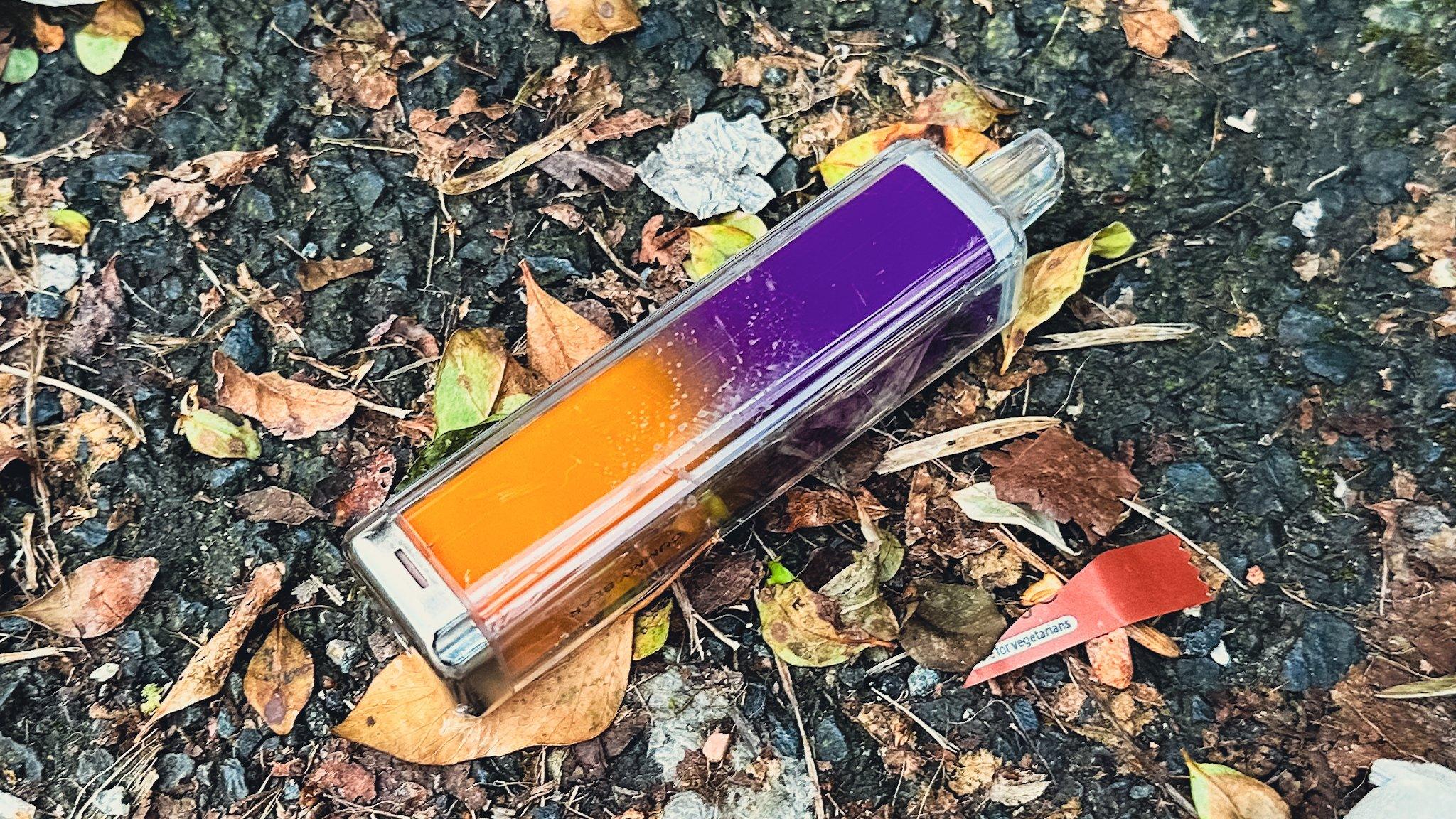Warning a child could die due to illegal drugs in vapes
- Published
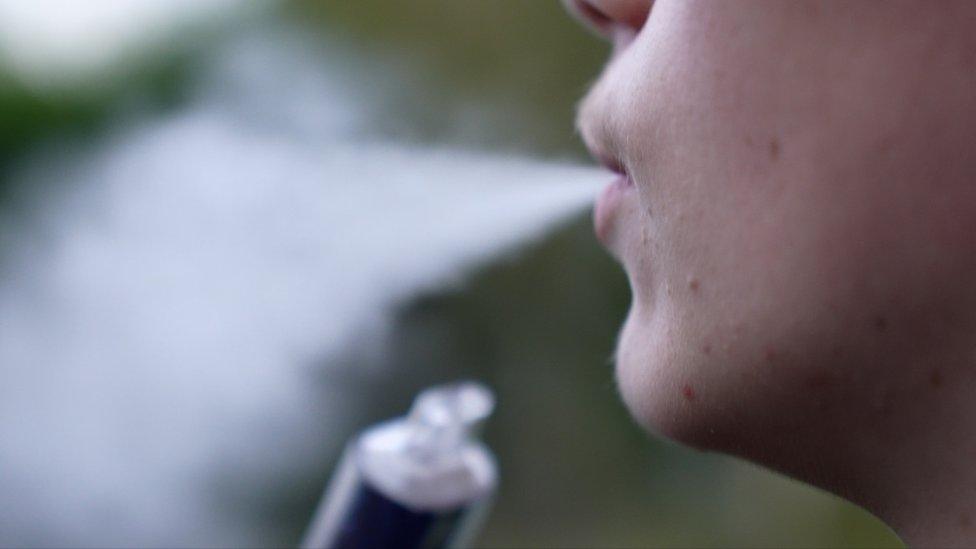
Cannabinoids such as spice and THC have been found in vapes in the Oldham area on four occasions recently
A head teacher is warning that illegal vaping could kill a child, after the collapse of a 12-year-old pupil who had used a vape containing spice - an illegal synthetic drug.
Glyn Potts, from Oldham, told the BBC he feared it would take a tragedy to prompt action to stop children vaping.
High levels of psychoactive cannabis oil and tetrahydrocannabinol (THC) have also been found in vapes in the area.
The government said it is planning new laws to prevent under-age vaping.
Dame Rachel de Souza, Children's Commissioner for England, said it was "deeply shocking to hear of children collapsing from spice contained in vapes", adding that she has previously called for the ban of disposable vapes.
She said: "We need to be moving faster on this issue, or we risk it spiralling out of control.
"We urgently need tighter restrictions on advertising and flavours of vapes that appeal to children as well as stricter licensing for retailers selling vapes."
"I pray that we don't have a fatality in these kinds of instances, but I do fear that is likely to happen if we don't address these matters," said Mr Potts, head of Saint John Henry Newman Catholic College in Oldham, a secondary school for pupils aged from 11 to 16.
It is illegal to sell e-cigarettes to people aged under 18, but a recent survey found one in five teenagers in England had tried vaping, an increase of a third on the previous year.
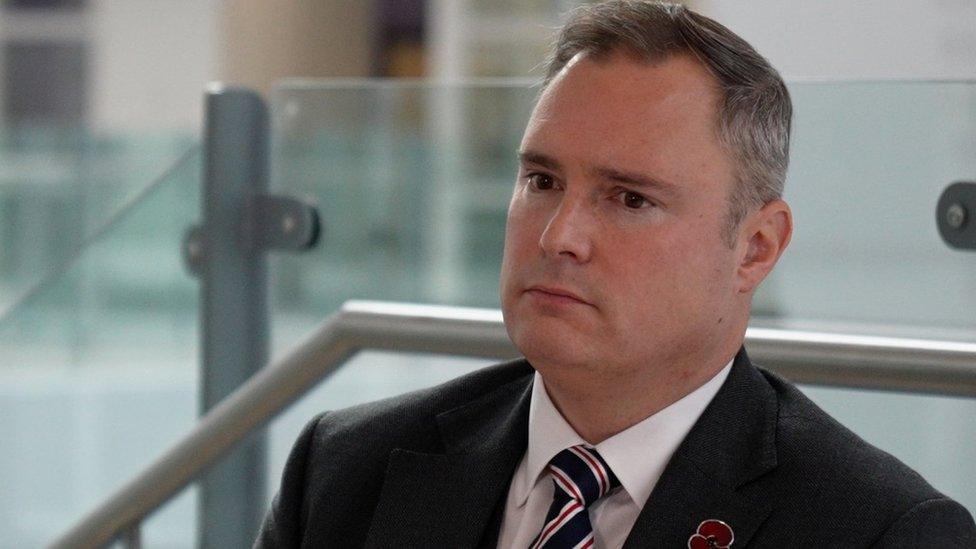
Glyn Potts said he had "nightmares" about his pupils collapsing in the street after using dangerous vapes
The popularity of vaping among youngsters comes amid concern about the emergence of illegal vapes containing excess nicotine content above the legal limit, and metals such as lead and nickel.
More recently, some vapes have been found to contain cannabinoids such as tetrahydrocannabinol (THC) and spice, which can be more potent than cannabis.
'Collapsed on the floor'
In July, a pupil at Mr Potts' school collapsed and had to be admitted to hospital after inhaling a vape containing spice, a laboratory-made drug known for its widespread illegal use in prisons.
"He took one very large inhalation of this vape pen and by the time he got off the bus on the school grounds felt very unwell. By the time he arrived at the school gates he had collapsed on the floor," said Mr Potts.
The pupil has now recovered.
A scientist, who later tested a number of refillable and single-use vapes taken from the school, said it was "very concerning" a child had inhaled spice, because it was known to cause "zombie-like paralysis" in users, particularly children.
Mr Potts said he was confident children could not vape in school but he was worried about incidents away from the premises.
"If they are collapsing in the street or in areas where they are not necessarily going to be found quickly, that gives me nightmares."
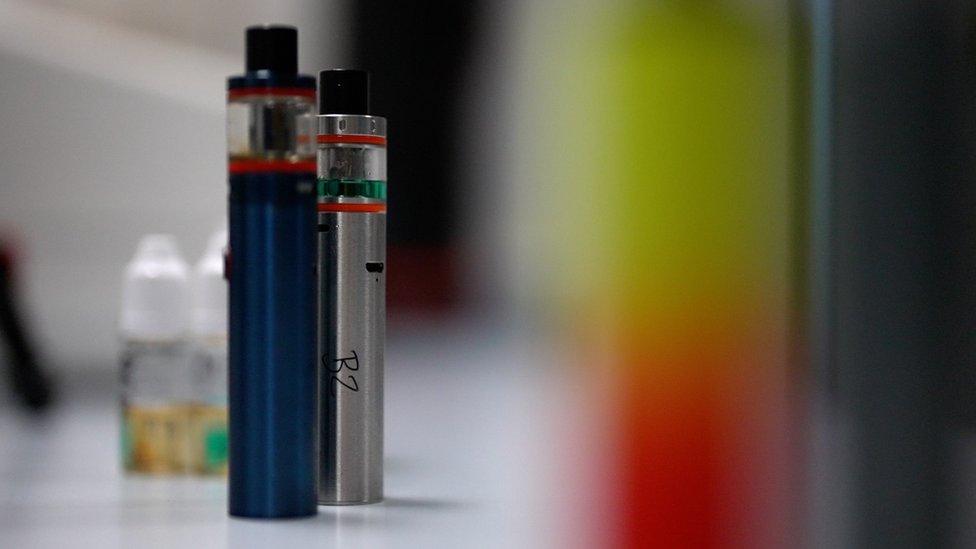
These vapes tested by chemical scientists in Manchester were found to contain spice and THC
He also said he had been told young people were using the tram network to obtain illicit vapes such as these from dealers in other parts of Greater Manchester.
In total, there have been four incidents this year in the Oldham area involving vapes found to have contained spice or THC.
A pupil at another school in the area collapsed in September after inhaling a vape containing butane hash oil with a 90% concentration of THC. The testing laboratory, the Manchester Drug Analysis and Knowledge Exchange (Mandrake),, external said it had never seen such high-strength THC in a vape. The team was set up in 2016 to help Greater Manchester Police tackle an "epidemic" of new types of psychoactive substances being found in the city.
'Shift in the market'
Mandrake director Dr Oliver Sutcliffe told the BBC the discovery of 90% THC rang alarm bells for the team.
"The fact that this product is present seems to imply that there may be a shift in the market. And the fact that we are starting to see this on our radar means that we need to be prepared for more of these types of products, with high purity and high potency THC becoming more commonplace."
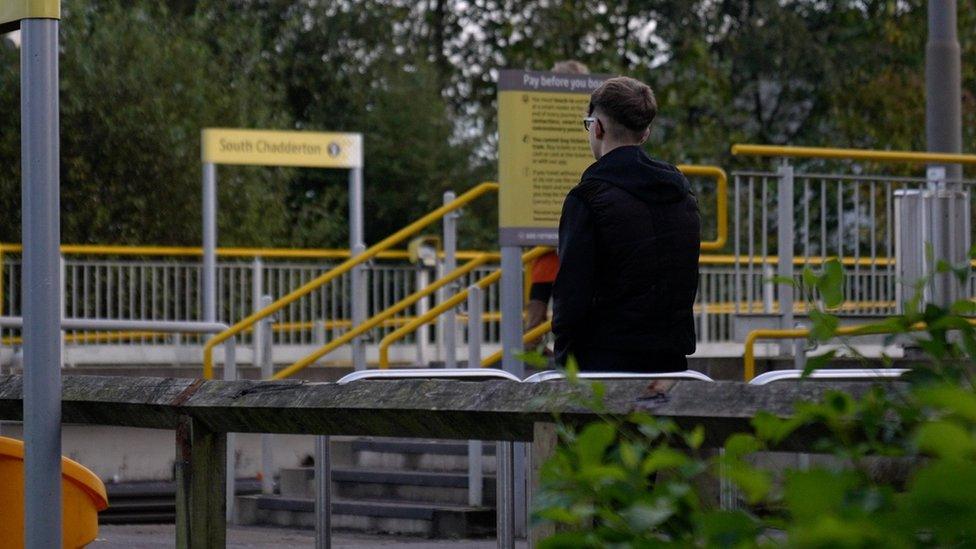
Mr Potts said he believes children are using the Manchester tram system to travel to buy drug-filled vapes
Sgt Joseph Dunne, who works in Oldham Prevention Hub for Greater Manchester Police, said the emergence of these illegal vapes was "very concerning".
"What we find is that some vapes have been tampered with or are being used specifically to house THC or spice. We are finding quite a lot of these children are getting vapes from other countries, where they will have a higher percentage of nicotine which isn't authorised in the UK, and that can make these children who aren't used to smoking very ill very quickly.
"Children taking these illegal vapes has become the main priority of our schools-based officers," he added.
"What we have found is that these vapes are being used communally in schools. The schools will find them in lockers and on top of lockers in drawers."
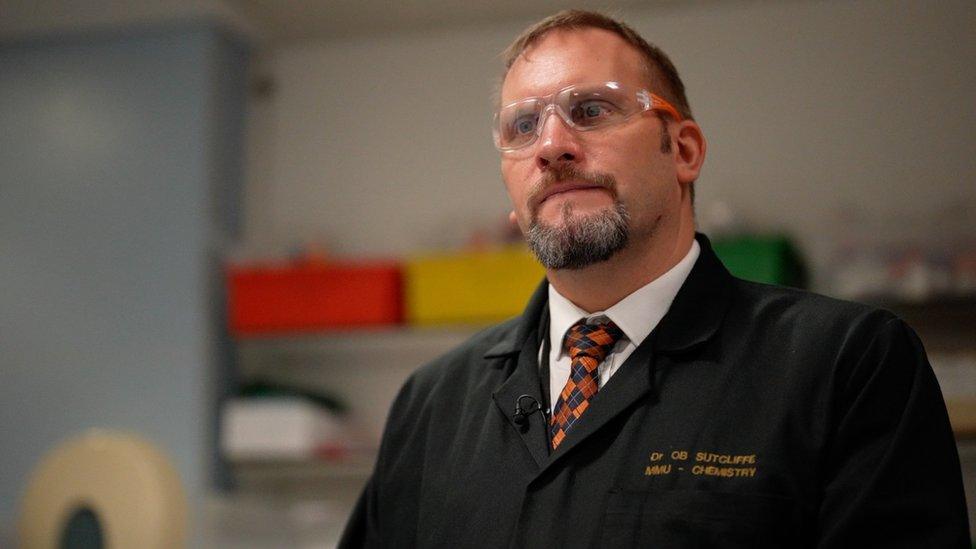
Dr Oliver Sutcliffe's team said the discovery of a vape containing 90% HTC signified a possible "shift in the market"
Greater Manchester Police, Oldham Council, and Trading Standards are working closely together, but Mr Potts says a national strategy is needed urgently to stop children vaping.
"I think we've got to accept that without the strategy to tackle this, more young people will be at risk."
The Department of Health and Social Care (DHSC) said it is consulting on measures to crack down on under-age vaping, banning disposable vapes and and restricting flavouring and types of packaging. Health officials say vaping remains an option for adult smokers wishing to quit their habit, but it is not a safe choice for children.
However, Mr Potts believes a major, co-ordinated effort is needed to cut off the supply of vapes to youngsters.
"The issues around vapes are as significant and of prime concern for us because of the ease of access and the sheer numbers of people who come into contact with these devices."
Related topics
- Published26 September 2023
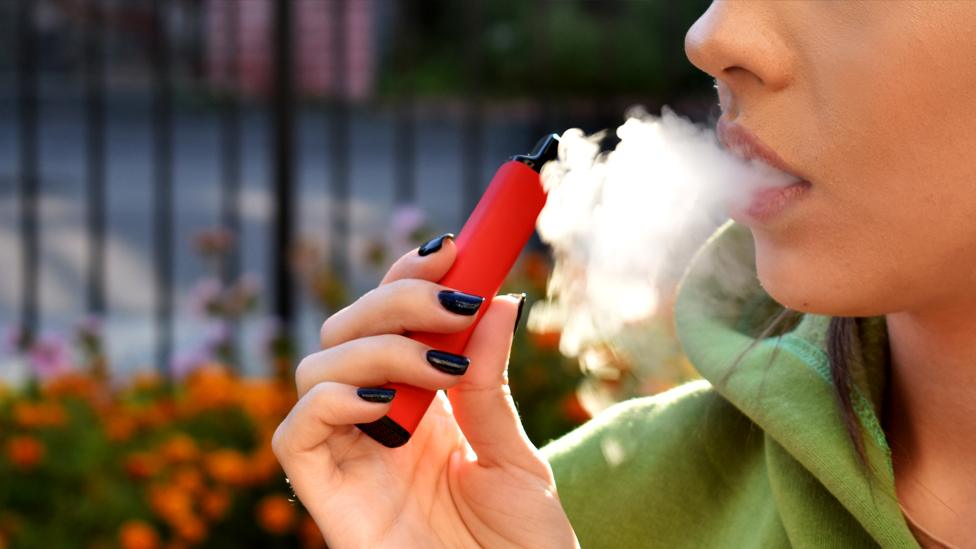
- Published6 June 2023
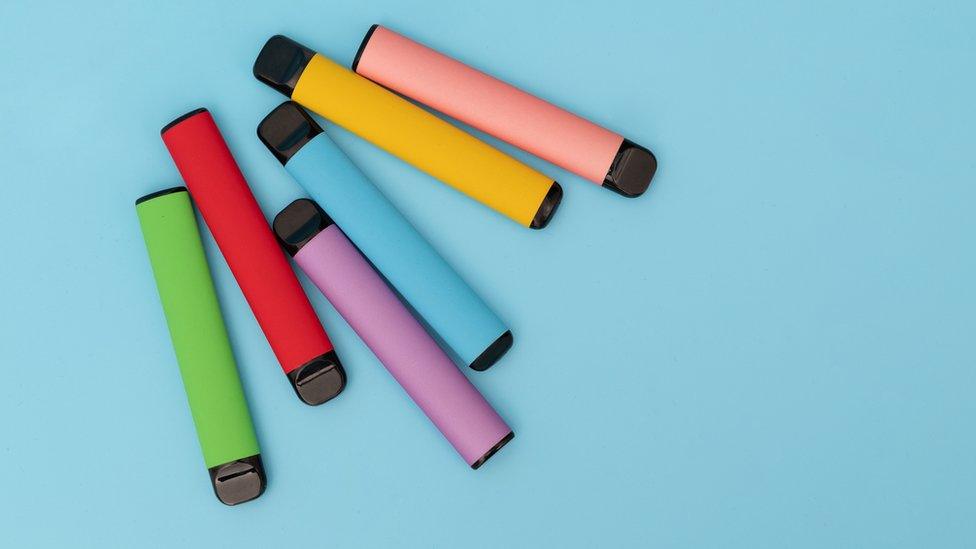
- Published23 May 2023

- Published14 March 2023
